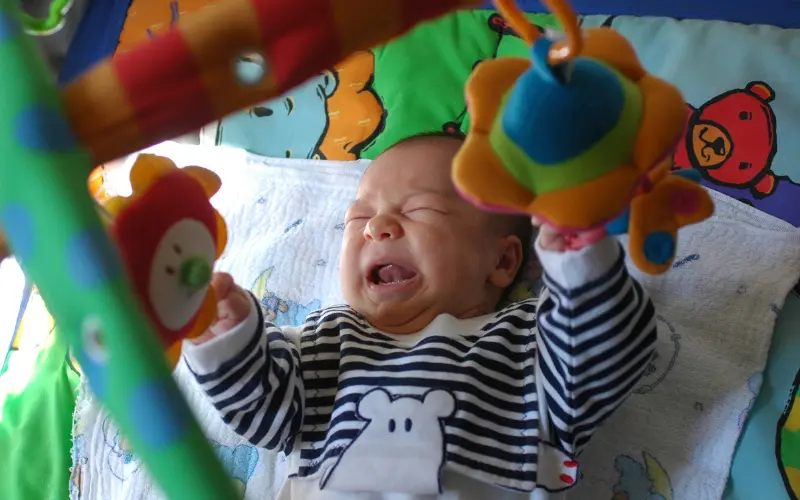Table of Contents
Child Early Morning Wakings
Early morning wakings are a common challenge for parents, especially when your child wakes up far earlier than expected. It’s natural to feel frustrated and tired when your child becomes a habitual early riser. However, without realizing it, some of the routines or habits we adopt to comfort our children might actually be encouraging these early wake-ups. In this guide, we’ll explore three ways you might be unknowingly reinforcing your childs early morning wakings, and we’ll offer practical solutions to help you and your little one reclaim more restful mornings. We’ll also introduce some useful products from our store to help make this process smoother.
One of the most effective strategies to manage your child’s early morning waking is to establish a consistent sleep routine. Creating an environment conducive to healthy sleep is essential, and incorporating methods that promote a relaxing bedtime can be highly beneficial. For expert insights on children’s sleep patterns, it’s recommended to follow the best practices set by the National Sleep Foundation. Establishing a routine and environment that mirrors these tips can greatly improve your child’s sleep and ensure better mornings for everyone.
1. Dealing with Childs Early Morning Wakings: Overstimulation Before Bedtime

One of the most common reasons for dealing with early morning wake-ups is overstimulation before bedtime. If your child’s bedtime routine involves high-energy activities, too much screen time, or a lack of winding down, their brain might still be too active when you put them to bed. This overstimulation can prevent them from falling into a deep, restful sleep, which often leads to early waking. In addition, the way you transition from active play to bedtime can significantly impact how well your child sleeps through the night.
If you’re struggling with your child’s early morning wakings, it’s essential to consider how this impacts your own sleep. Many parents experience sleep deprivation, which can affect your mood, energy levels, and overall well-being. To help you navigate this challenging phase, check out our article on How to Deal With Sleep Deprivation After Baby. This resource provides practical tips and strategies to manage your fatigue and regain a sense of normalcy, ensuring you can be the best parent for your little one while tackling those early mornings.
What You Can Do:
To prevent overstimulation, focus on creating a calming and consistent bedtime routine. The last 30 to 60 minutes before bedtime should be dedicated to low-key, relaxing activities. Soft lighting, gentle music, and bedtime stories can help signal to your child’s brain that it’s time to unwind. Avoid screens, as the blue light emitted from tablets, smartphones, and TVs can trick the brain into thinking it’s still daytime, making it harder for your child to settle down.
To enhance this wind-down time, consider using our Nighttime Soother Sound Machine. This machine offers calming sounds such as white noise, rain, or gentle lullabies, which can help your child relax and fall asleep faster. White noise, in particular, is known to help babies and toddlers stay asleep longer by drowning out household sounds that may wake them up prematurely.
Another helpful addition to your child’s sleep environment is our Blackout Curtains. Early morning light is a frequent culprit behind early morning wake-ups. If sunlight streams into your child’s room before their internal clock signals it’s time to wake up, they might stir and become fully awake. Blackout curtains block this light, helping your child stay asleep longer in the mornings, especially during the summer months when the sun rises earlier.
Additional Tips for Creating a Calming Bedtime Routine:
- Consistency is key: Ensure bedtime happens at the same time every night, even on weekends. This consistency helps regulate your child’s internal body clock.
- Incorporate soothing activities: Try reading books, listening to soft music, or giving your child a warm bath before bed. These rituals create positive sleep associations.
- Limit stimulating foods and drinks: Avoid giving your child sugary snacks, chocolate, or any drinks with caffeine (even in trace amounts) late in the day. These can contribute to restless sleep.
By implementing these strategies, you can significantly reduce overstimulation and create a peaceful environment that encourages deeper and longer sleep.
2. What to Do When Your Child Wakes Up Too Early: Rushing to Soothe Them

When your child wakes up early, it’s instinctive to rush into their room to soothe them immediately. Whether it’s offering comfort, a bottle, or just being present, your quick response could actually be reinforcing the behavior. When your child learns that waking up early results in immediate attention or interaction, they are more likely to continue waking up at those early hours expecting the same response.
As parents, we often find ourselves troubleshooting our child’s early morning wakings, but one crucial factor can be overlooked: the role of diaper management. If your little one is experiencing discomfort from diaper blowouts or leaks during the night, it can significantly disrupt their sleep. Ensuring that your child has a proper fit and absorbent diapers can help prevent these issues, leading to more restful nights for both you and your baby. For effective strategies on how to manage these common challenges, check out our article on Managing Diaper Blowouts and Leaks
What You Can Do:
Instead of rushing in right away, give your child a few minutes to see if they can settle back to sleep on their own. Self-soothing is an important skill that helps children go back to sleep independently, and it’s an essential aspect of healthy sleep habits. Of course, if your child is crying for an extended period or seems distressed, you should comfort them—but waiting a few minutes before responding can give them the chance to fall back asleep on their own.
To support this, you can introduce visual cues to help your child understand when it’s time to get out of bed. Our Sleep Training Clock is an excellent tool for this. This clock uses colors or pictures to signal when it’s okay to wake up and when it’s still time to sleep. For instance, you can set the clock to show a sun when it’s time to wake up and a moon during sleep time. This visual reinforcement helps your child comprehend what’s expected of them.
In addition, creating a comfortable and cozy sleep environment can encourage your child to stay asleep longer. Consider using our Organic Cotton Sleep Sack, which is soft, breathable, and keeps your child warm without overheating. A comfortable sleep space helps your little one feel safe and secure, making it more likely that they’ll sleep through the early morning hours.
Tips for Encouraging Independent Sleep:
- Gradual delays: If your child is used to immediate attention upon waking, gradually extend the time before you go in. Start by waiting a minute or two, then slowly increase the time over several days or weeks.
- Comfort items: Give your child a comfort item like a soft toy or blanket that they can turn to for comfort when they wake up early.
- Praise and rewards: Positive reinforcement can be helpful. Praise your child when they stay in bed until the desired wake-up time or offer small rewards for consistent behavior.
3. Combating the Early Morning Wake-Up: Offering Snacks or Drinks Too Early

A third way parents inadvertently reinforce early morning waking is by offering snacks or drinks too early. If your child has grown accustomed to getting milk, snacks, or food as soon as they wake up, they might wake up early out of habit, anticipating their morning “reward.” This association between early waking and food or drink can cause a pattern of waking up at undesirable hours.
Early morning wakings in children can be distressing for both kids and parents. It’s essential to understand various health conditions that might contribute to sleep disturbances, including jaundice in newborns. Jaundice is a common condition that affects many infants, leading to symptoms such as yellowing of the skin and eyes, lethargy, and feeding difficulties. If you notice any signs of jaundice in your newborn, it’s crucial to seek medical advice. For more information on the symptoms, causes, and treatment of jaundice in newborns, check out our comprehensive article on Jaundice in Newborns – Symptoms, Causes, and Treatment
What You Can Do:
If you believe hunger is causing your child to wake early, consider adjusting their dinner or bedtime snack. Providing a more filling and nutritious dinner, or a small, healthy snack before bed, can help keep their tummies full throughout the night. Foods that are high in protein or complex carbohydrates, such as oatmeal, bananas, or whole-grain crackers, can keep hunger at bay longer than sugary snacks.
Gradually delay offering food or drinks until it’s closer to their regular wake-up time. For example, if your child typically wakes at 5:30 AM and you’ve been offering breakfast at that time, slowly push the meal time by 10 or 15 minutes every few days until they’re eating closer to 7 AM. You can also offer water instead of milk or snacks if they wake up early, as water won’t have the same reinforcing effect.
To help manage snack time throughout the day, our Baby Snack Container Set is a convenient way to prepare snacks in advance. These containers are perfect for portioning out healthy snacks for both bedtime and daytime use, making it easier to stick to a routine that doesn’t revolve around early wake-ups.
Additional Tips for Combating Hunger-Related Early Waking:

- Offer a healthy bedtime snack: Consider a small snack 30 minutes before bed, such as a banana or some oatmeal. Avoid sugary or overly processed foods, which can cause blood sugar spikes.
- Delay breakfast: Gradually push back breakfast time to discourage early waking, and try to keep meals on a predictable schedule.
- Offer water if needed: If your child asks for something to drink early in the morning, offer water instead of milk or juice.
Recap: Dealing with Early Morning Wake-Ups and Combating Them
By addressing these three common ways parents unknowingly reinforce early morning wake-ups, you can help your child develop healthier sleep patterns. Here’s a quick recap:
- Provide a calm, consistent bedtime routine to prevent overstimulation. Using products like the Nighttime Soother Sound Machine and Blackout Curtains can help create a peaceful sleep environment.
- Teach your child to self-soothe rather than rushing in immediately. The Sleep Training Clock can be a valuable tool in helping your child understand when it’s time to wake up.
- Delay offering food or drinks until closer to a reasonable wake-up time to discourage the association between early waking and snacks. The Baby Snack Container Set makes it easy to prepare healthy snacks in advance.
Traveling with a baby can be a rewarding yet challenging experience, especially when it comes to maintaining their sleep schedule. If you’re planning a trip, it’s essential to understand how to prepare your little one for new environments. Having the right gear can make all the difference. For instance, a portable crib or travel bassinet ensures your baby has a familiar sleeping space, while a comfortable stroller can help manage outings and keep them content. To learn more about the must-have gear and tips for a smooth journey, check out our guide on How to travel with a baby, and the gear you need
What to Do When Your Child Wakes Up Too Early: Final Thoughts
Changing your child’s early morning waking habits takes time, consistency, and patience. By making small adjustments to their routine, using the right tools and techniques, and encouraging healthy sleep habits, you can gradually reduce the frequency of early morning wake-ups.
Combating the early morning wake-up can feel overwhelming at first, but remember, consistency is key. It’s important to give these changes time to work, and to remain calm and patient throughout the process. Products like the Nighttime Soother Sound Machine, Blackout Curtains, and Sleep Training Clock can help create an environment conducive to better sleep for both you and your child.
By taking these steps, you can enjoy more peaceful mornings and ensure that both you and your child are getting the rest you need.

